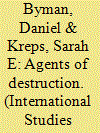| Srl | Item |
| 1 |
ID:
095638


|
|
|
|
|
| Publication |
2010.
|
| Summary/Abstract |
This article evaluates state-sponsored terrorism as a principal-agent issue. More often applied to the study of licit national or international institutions as a way to improve their governance, we argue that applying principal-agent analysis to illicit relationships such as those between states and terrorist agents is an equally fruitful application, though one with different objectives. Rather than being used as a tool to improve governance, applying principal-agent analysis to illicit relationships such as state-sponsored terrorism may point to areas of susceptibility and thus inform more effective counterterrorism strategies. In this article, we explain why states delegate to terrorist groups, how they seek to control their agents, and the tensions in the relationship, both generally and through specific reference to Iran's sponsorship of Hizballah, Syria of various Palestinian groups, and the Taliban of al-Qa'ida. This analysis yields propositions about the conditions under which states are likely to delegate to terrorist groups and specific recommendations on how principal-agent problems of these illicit relationships may be used in practice to combat terrorism.
|
|
|
|
|
|
|
|
|
|
|
|
|
|
|
|
| 2 |
ID:
097178


|
|
|
|
|
| Publication |
2010.
|
| Summary/Abstract |
This article provides a discussion of the foundation of Lashkar-i-Taiba (LeT), the development of its modus operandi, and engages in an investigation of LeT's activities in India and Pakistan, including the Kashmir region. Further, LeT's fundraising methods are touched upon and LeT's relationships with regional state and non-state actors such as Pakistan's Inter-Services Intelligence (ISI) and Dawood Ibrahim's D-Company are analysed. This article argues that although LeT has been a vital component of Islamabad's regional strategy in the past, the organisation has grown beyond the control of its former patron and is largely self-sufficient and is able to operate independently of the political process. These developments challenge the long-held notion that irregulars can be sustainably used to achieve limited objectives in an asymmetric conflict and should serve as a clear warning to other state sponsors of terrorism. However, contrary to many analyses, LeT is not likely to sacrifice its independence and come under Al-Qaeda's umbrella. Rather, LeT will continue to evolve into a distinctive terrorist actor in its own right while still receiving aid from fringe elements in Pakistan's security and intelligence apparatus and elsewhere.
|
|
|
|
|
|
|
|
|
|
|
|
|
|
|
|